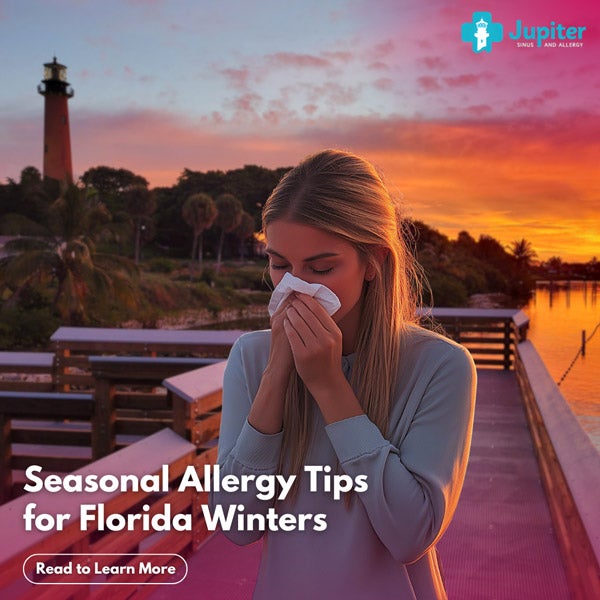Seasonal Allergy Tips
Seasonal Allergy Tips for Florida Winters
Seasonal allergies are a significant concern for many Florida residents. As the seasons and air change, so do the allergens that travel in the air for miles at a time.
While Florida boasts of a beautiful climate all year round, some allergens can be more prominent during certain seasons – and depending on what your allergy triggers are, you might have to suffer from allergy symptoms throughout the year too.

Allergies During Florida Winters
During the winter season, Florida residents may see a decrease in grass and weed allergens, so if these are your triggers, expect some relief once winter hits. There is, however, a rise in tree pollen allergens. Oak and pine trees are common allergens you might want to watch out for.
As people spend more time indoors to escape the cold breeze, there is also a rise of indoor allergens like dust mites and pet dander.
It can be scary to even think about having to deal with seasonal allergies, especially with the holidays looming just over our heads. If your allergies act up during the winter season, then you must have a few seasonal allergy tips up your sleeve to survive this winter season.
Keep in Mind: Seasonal Allergy Tips for Florida Winters
-
- Keep doors and windows closed
Pollen and other airborne allergens can easily travel for miles through the air. You don’t want any of it inside your home. It’s important to keep the windows and doors to your home closed and tightly sealed. This is an especially important thing to remember if the winds are strong outside.
-
- Monitor pollen and allergen counts
If you know what specifically your allergy triggers are – whether they’re tree, grass, or weed pollen or mold – it would be especially helpful to always check and monitor pollen and allergen counts before you head outside. If the counts are too high, it would be better to stay indoors. If you can’t stay inside, prep yourself by using face masks and other protective clothing to limit your exposure to allergens.
-
- Limit outdoor activities
During peak allergy seasons, stay indoors as much as possible. Always check pollen counts to have enough information on allergens outside your home. During these times, choose to do indoor activities instead.
-
- Shower after spending time outdoors
After spending time outside, immediately change out of your outdoor clothes and get in the shower to remove any pollen and other airborne allergens from your skin and hair. It would be best to immediately wash your outdoor clothes as well. This will prevent the spread of allergens into the rest of your home.
-
- Keep your home clean
People tend to spend more time indoors during the winter season so keeping your home clean is more crucial than ever. Regularly vacuum and dust around your home to minimize dust mites and pet dander. Regularly wash and change your bedding too to reduce exposure to harmful allergens. This ensures that you sleep in a clean and healthy environment.
-
- Use air purifiers
Air purifiers come in handy to ensure that indoor air quality is good and healthy for your family. Use one with a HEPA filter to make sure that it efficiently filters out allergens in your home so your family doesn’t breathe them in.
-
- Boost your immunity
It’s always wise to strengthen your immune system and keep your defenses up against common winter conditions. While they don’t necessarily cause allergies, they can exacerbate your symptoms and make you feel worse.
Maintain a healthy diet of foods rich in vitamins and nutrients. Drink plenty of water and exercise regularly. Make sure you get enough sleep and learn to manage your stress. You can also add vitamins and supplements to your diet to further strengthen your defenses.
When It’s Time to Consult, Jupiter Sinus and Allergy Can Help
When all else fails, consulting with a professional might do your allergies wonders. If you still haven’t had one done yet, they may perform an allergy test to pinpoint what your allergy triggers are. From there, they can prescribe allergy medications and management strategies to help you manage your allergies better.
At Jupiter Sinus and Allergy, we are committed to helping our patients better manage their allergies and other sinus concerns. Schedule an appointment with us today and let’s get to the bottom of your concern!
This blog is for informational purposes only and should not be considered medical advice. Always consult a licensed healthcare professional regarding any medical condition or treatment.
The information provided in this article is for informational and educational purposes only and does not constitute medical advice. It is not intended to diagnose, treat, cure, or prevent any disease or medical condition. Always seek the guidance of your physician or other qualified healthcare provider with any questions you may have regarding a medical condition or treatment.
Results may vary: Treatment outcomes and health experiences may differ based on individual medical history, condition severity, and response to care.
Emergency Notice: If you are experiencing a medical emergency, call 911 or seek immediate medical attention.


